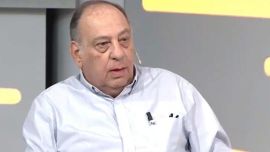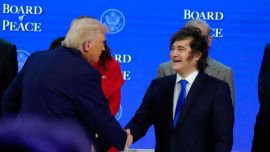President Javier Milei has shuttered a special government unit tasked with investigating the disappearance of children who were kidnapped as babies by the junta of the 1976-1983 military dictatorship.
The closure of the Unidad Especial de Investigación de la Desaparición de Niños (UEI), which forms part of the CONADI (Comisión Nacional por el Derecho a la Identidad) government body that probes crimes committed by the dictatorship, was justified on the grounds that its powers “invade the competences of the Public Prosecutor's Office in the investigation of criminal acts, thus affecting the separation of powers.”
The decision met with criticism from human rights experts. Former human rights secretary Horacio Pietragalla accused it as an “attack on the search for stolen babies.”
"The government has closed the unit created to search for people kidnapped as babies during the dictatorship. Some 300 still do not know their identity," said the CELS human rights group in a statement posted on social media.
"This measure is part of the official plan for impunity and cancellation of policies to repair the social damage caused by illegal repression," it added.
The Abuelas de Plaza de Mayo NGO denounced “a new attack against the search for our granddaughters and grandchildren appropriated during the last civil-military dictatorship.”
“We demand that the National Government inform how it will continue to develop the work carried out by the unit, which is central to clarify crimes against humanity,” it said in a statement.
Back in June, the iconic human rights group had warned that Milei would move to shut the body, which was established in 2004. It described it as “a shining example of the regressive measures being pushed from the government, which deserve special attention.”
The move was made official through the publication of Decree 727/2024 on Wednesday, signed by President Milei and Justice Minister Mariano Cúneo Libarona, which claimed the agency’s powers violated the separation of powers established in the National Constitution.
The special unit has, since 2004, been tasked with locating and identifying babies who were taken from their mothers and appropriated by the military junta – most of whom would be around 45 years of age today.
The UEI has helped facilitate searches for the nearly 300 grandchildren which the Abuleas have been searching for 47 years. It assists judges and prosecutors in cases of possible identity theft, to prevent any dismissals of cases in court.
It dealt primarily with state archives, often supporting judicial requests from prosecutors investigating crimes and had wide powers to access relevant files of those linked to cases.
The unit, which also coordinated with human rights groups, was also empowered with carrying out investigations “on its own initiative, communicating its results to the judicial authorities and the Public Prosecutor's Office,” reads the decree.
In order to prevent the cover-up of crimes against humanity, it was granted “direct access to all the files of the agencies under the National Executive Branch, including those of the Presidency of the Nation, the Cabinet Chief’s Office, its dependent agencies, the Armed and Security Forces and the registry agencies."
These wide-ranging powers are specifically what the Milei administration has objected to. In its decree it described them as “violating the constitutional regime” and lacking “constitutional support.”
The decision is the latest in a series of controversial measures related to human rights policies. Government critics have accused officials of denialism and of relativising the crimes of the dictatorship.
The Milei administration sparked controversy with a video produced to mark the anniversary of the March 24, 1976 coup that brought the military dictatorship to power, in which it called for a “complete memory” of the conflict and claimed the estimate of 30,000 disappeared was manufactured by human rights groups.
Recently, a group of six lawmakers from Milei’s La Libertad Avanza party visited a prison in Buenos Aires Province to meet a number of jailed individuals convicted of crimes against humanity committed during the 1976-1983 dictatorship, including Alfredo Astiz, the so-called ‘Angel of Death’ who has been sentenced to life imprisonment for his crimes.
The visit was reportedly aimed at “looking at the living conditions” of the detainees.
Argentina’s shift to democracy in 1983 and the years of uninterrupted democratic rule that have followed have been accompanied by a process of memory, truth and justice that has seen human rights violators jailed for crimes against humanity.
CONADI is the executive branch body responsible for collaborating with human rights groups in the search for their grandsons and granddaughters. Created in 1992 to comply with the UN Convention on the Rights of the Child, which recognised the right to identity, its existence was ratified by law in 2001.
In 2004, then-president Néstor Kirchner signed a government decree establishing the UEI special investigation unit within CONADI and empowering it to access all archives held by the state in order to find the appropriated babies.
Human rights experts say the closure of the special unit is the latest in a series of steps designed to halt CONADI’s work and cut costs.
Security Minister Patricia Bullrich has criticised the body as “militant,” while in June the Justice Ministry removed special powers allowing CONADI to investigate and access state archives.
The Milei administration says all new investigations should be conducted by the Public Prosecutor’s Office and not by individual government bodies.
It is unclear what will happen to ongoing investigations currently being overseen by the UEI or CONADI.
In April, the government laid off several employees from a special analysis team that investigates records and documentation by the three branches of the Armed Forces probing crimes against humanity.
– TIMES/PERFIL

























Comments